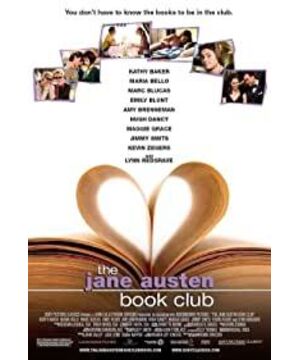Perhaps this quote from David Danby is a good explanation: "Jane Austen writes romantic comedies, and there's nothing in her books—whether it's fate or God, whether it's danger or chance —can separate the man and woman she has chosen. In spite of many hesitations and misfortunes, they are joined together, like two halves of a bridge. The reader knows instinctively how her book will end, No matter what else they get from Jane Austen, they cherish the satisfaction of being a man and a woman together." Perhaps that's why Bernnie, Joycelyn, Sylvia, a group of women of all ages, love Austen so much. Alien women presumably wishing to break free from their almost devoid of love-scented lives, to grab the soul-fulfillment of that comforting love story in Austin's Story Manor?
Austin Book Club is a heartwarming film that spreads from this book club of five women and one man—Bernnie, Joycelyn, Sylvia, Allegra, Prudie, and Grigg—from Emma to Pride and Prejudice", to "Northanger Abbey", to "Persuasion"... Along with the sharing of the book's insights into the story, each of their stories are also splattered like splashes of ink on the canvas, until the last picture In the party of the sunny beach with artistic conception (even if this is not the end of the film) - the blue sky and blue sky, the picture of golden light reflected by the hot sun - make a moving ending, these protagonists have the story of Austin The comedy ending of , everyone finds that love belongs to. The film has the taste of using the name of Austin to some extent, but it does not make the name of Austin lose its color. When you follow the protagonists to the end, these people reading Austin are also examining themselves when deconstructing the novel. At the end of the reunion, you will laugh with them knowingly, and then ask yourself: Do you want to reread it too? Austin?
This woman of the bourgeois society, this woman who never married and hardly ever stepped out of the house a few times (probably now called a house girl), can be called by Trilling the first concrete expression of Hegel's "Secularization of the spirit", her novels can stand in the forest of classics not only the satisfaction brought by those touching stories, but also those "and more" for morality and life. understanding and torture.
Prudie, a woman who apparently lived a life as rigid as her crisis-ridden marriage, whose French teacher reveals her life in her explanation of Allegra wearing her wedding ring on her right hand She loves the imminent flames in her heart, and the derailment fantasies that are eventually stirred up by the male students. To be stared at recklessly by this boy with a charming smile, to be touched, flirted with by him during rehearsal of the stage performance--I can't help it, and finally beckoned by the boy next to the motorcycle on the other side of the road, is an important decision in this woman's life. The moral questionnaire threw out in "Austin Book Club" finally found a satisfactory answer in that book "Persuasion" - two people who no longer love each other learn to love each other again, and the woman who tries to cheat is still lying down back to her man.
The good interrogation at the beginning of the movie lingers: Austen never writes about life after marriage, because after marriage is no longer a fairy tale? Maybe the comedy's ending will be as ultimately broken as Sylvia's 20-year marriage. In our reality, there are many endings after such love endings. In Britain, the Victorian era is far away, and the latest data from social research shows that more than half of children come from divorced families. This figure with a lot of dejected atmosphere probably can't make people have much expectations for love, marriage, and life. Especially during this period when people were dazed by the financial tsunami, many families in the West were already disintegrated in the waves - the impact of money alone made marriage unbearable, where did love go?
At this time, these people should probably take a good look at Jane Austen on the shelf and let her novels tell you how life should be interpreted and how morality and love should bloom in life. Appreciate that the characters in their stories make mistakes and experience setbacks, but they have never given up their willpower and judgment, they will correct themselves, and will slowly approach their ultimate happiness... "Austin Book Club" does not share with Austin's The novel is somewhat related, but the men and women in it faithfully implement this Austen belief. Prudie and her husband learn to love each other again, Sylvia's husband Daniel returns from a lost relationship, and Joycelyn begins to put aside her ego to accept Grigg, the lovely man with an amiable smile.
When you start to get lost in your life and start to be numb, picking up Jane Austen will be a warm consolation for the soul and a repair for life by literature.
View more about The Jane Austen Book Club reviews











